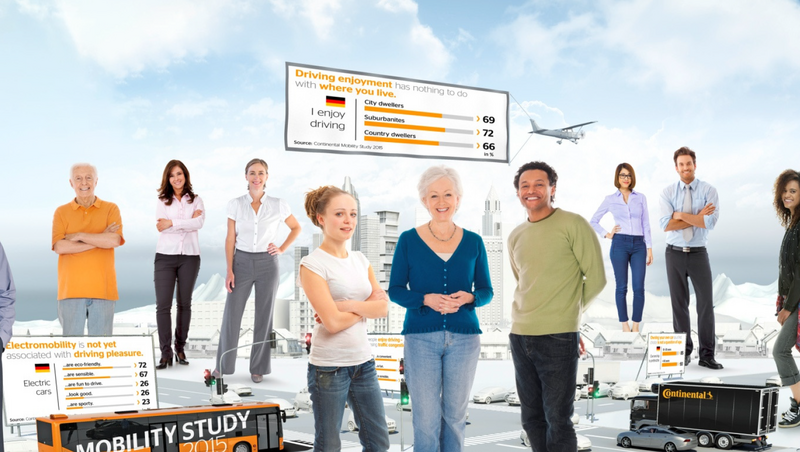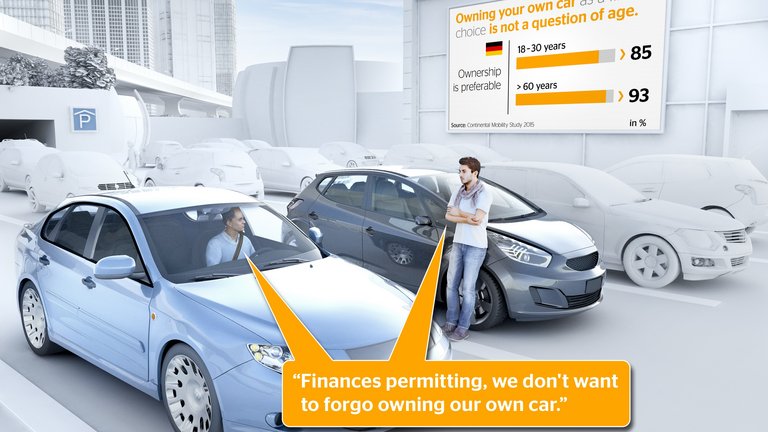Mine! Car Ownership Extremely Popular, Even Among Younger Generations
- Above all, driving is more a question of money than of age or location
- Young people want large, powerful, and prestigious cars
- Automation and networking ride high among drivers
Hanover, January 29, 2015. Not owning a car is out of the question for the majority of drivers in Germany. According to the "Continental Mobility Study 2015," the vast majority (83%) of vehicles are owned personally and only 1% of respondents make use of car-sharing services. Local drivers like to use their own cars for everyday travel – despite increased traffic volume. For example, 97% consider driving convenient and 93% enjoy it. Very few people have a guilty conscience about it, with only 7% seeing it as unreasonable.
The preference to own a car or the enjoyment of driving is not a question of age or location. For 85% of 18- to 30-year-olds, owning a car is still the first choice. In addition, around one in two city dwellers (46%) attach importance to owning a vehicle, and the majority (69%) like driving just as much as those who live in the countryside (66%). The decision to obtain a driving license as an entry ticket for individual automobility ultimately depends just as much on money as owning a car does: cost reasons are the deciding factors for two out of three respondents under 30 years of age without a driving license (22%), and the same reasons apply for those with a valid driving license but without their own car (27% of those under 30). 59% of people in this category forego owning a car for financial reasons.
For the " Continental Mobility Study 2015 ," the international automotive supplier Continental had the market and social research institute infas conduct a representative survey of drivers in Germany and the U.S.A. and a qualitative survey in France, Japan, and China in the second half of 2014. Experts from science and the automotive industry were also interviewed.
"Driving is, and will remain, primarily driven by emotion and less so by reason. The vast majority of people like driving and don't want to do without their car for everyday travel. We therefore don't expect a very noticeable decline in individual car use in the medium term," said Chairman of the Continental Executive Board Dr. Elmar Degenhart during publication of the study's results on Thursday.
For "Generation Smartphone," Degenhart called for the systematic networking of cars to form part of the Internet: "Contrary to the conflicting theory we hear time and again, young people too still want to own their own car. But cars need to become more intelligent as well as send, receive, and process information quicker in digital format. So it's up to the automotive industry itself to keep up with the living situations and requirements of young people and, for example, to offer a wider range of networked services in the vehicle."
Young generations attach importance to vehicle dynamics, image, and comfort
Small and mid-size cars are right at the top of the shopping list for young people in Germany, with 51% of 18- to 30-year-olds who took part in the study stating a preference for small or mid-size cars. However, there could be an increase in sales of large, powerful cars if their funds would allow it. After all, sedans (18- to 25-year-olds: 21% / 25- to 30-year-olds: 26%), SUVs (18- to 25-year-olds: 13% / 25- to 30-year-olds: 19%), and sporty cars (18- to 25-year-olds: 21% / 25- to 30-year-olds: 16%) enjoy great popularity among young drivers. Consideration of environmental aspects is likewise falling slightly with only 35% of 18- to 25-year-olds and 36% of 25- to 30-year-olds stating they would choose a smaller vehicle model in favor of lower emission values. So it is not surprising that the majority of respondents consider the vehicle's image a high priority: 59% of both age groups feel it is important to own a vehicle that others like, too.
"Young people don't want a basic car but instead attach importance to vehicle dynamics, image, and comfort," said Degenhart. With regard to the future prospects of the automotive industry, he concluded: "There is no reason to assume that young drivers in Germany will turn their back on their cars in the foreseeable future."
Drivers show great interest in automation and networking
On the whole, drivers in Germany – including older drivers – are likewise open to new technologies, and many rely on automated driving functions to assist them with everyday travel. For example, more than two-thirds of all drivers (68%) want to make use of automated driving in stressful or monotonous driving situations in particular. And many drivers show great interest when it comes to intelligent vehicles and their sending, receiving, and processing of information, too. Networked services are primarily accepted when they create recognizable added value.
The majority of drivers want improved traffic control through data exchange (72%), an event data recorder (69%), or maintenance schedules based on real-time vehicle data (63%). Monitoring services, however, are rejected.
For example, currently only 37% of respondents would have their own driving style recorded or monitored by in-car systems in order to reduce their insurance premium.
"Data protection is, and will remain, a decisive criterion when it comes to introducing networked services," said Degenhart, adding: "Our strategy for Automated Driving 2025 takes this requirement into consideration. Anonymized monitoring of road traffic is sufficient for zero accidents. We do not need to know the individual license plate for this purpose. In many cases, anonymous information on aspects such as position, time, and event is perfectly sufficient."
On the future of cars, he said: "To further increase the attractiveness of cars, there must be further developments in their intelligence in particular – not their form of ownership or marketing. Digitization and automation form the basis for comprehensive vehicle information management and for relieving the burden on drivers in increasing road traffic. Therein lies the key potential to intelligently redefine individual mobility."






